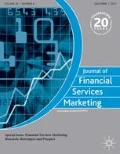Abstract
Consumer distrust is particularly salient in the context of the current mortgage crisis, and mortgage companies are looking for ways to change their image and regain consumer confidence. This study examines whether advertisements portraying a message of corporate social responsibility (CSR) might help financial institutions in enhancing consumer perceptions of the company. One hundred subjects were randomly selected from among the faculty and staff of a large American university. Subjects were exposed to advertisements, with or without a CSR message, for two well-known service organizations (JP Morgan Chase and Verizon). Results suggest that consumers harbor negative attitudes toward mortgage companies and skepticism about advertising from these companies, but that the inclusion of a CSR message can mitigate these effects, resulting in improved attitudes toward the company. Managerial implications are discussed.


Similar content being viewed by others
References
Gogoi, P. (2009) CEO Jamie Dimon steers JPMorgan Chase through crisis. USA Today, 27 July, Money, http://www.usatoday.com/money/companies/management/profile/2009-07-26-jpmorgan-chase-ceo-dimon_N.htm.
Consumer Confidence in Financial Services Reaches New Low. (2009) 11 October, http://blog.taragana.com/pr/consumer-confidence-in-financial-services-reaches-new-low-7293, accessed 10 November 2009.
Reuters. (2009) New US Consumer Survey Shows High Distrust of Financial Services Companies. 20 January, http://www.reuters.com/article/pressRelease/idUS133370+20-Jan-2009+BW20090120, accessed 10 November 2009.
Kuhnhenn, J. (2009) Analysis: US bailout successful but fueled public anger, distrust. Arizona Daily Star, 21 October.
Darke, P. and Ritchie, R. (2007) The defensive consumer: Advertising deception, defensive processing, and distrust. Journal of Marketing Research 44 (February): 114–127.
Rotter, J.B. (1967) A new scale for measurement of interpersonal trust. Journal of Personality 35 (4): 651–665.
Schul, Y., Mayo, R. and Burnstein, E. (2004) Encoding under trust and distrust: The spontaneous activation of incongruent cognitions. Journal of Personality and Social Psychology 86 (5): 668–679.
Yoon, Y., Gürhan-Canli, Z. and Schwarz, N. (2006) The effect of corporate social responsibility (CSR) activities on companies with bad reputations. Journal of Consumer Psychology 16 (4): 377–390.
Sen, S. and Bhattacharya, C.B. (2001) Does doing good always lead to doing better? Consumer reactions to corporate social responsibility. Journal of Marketing Research 38: 225.
Brown, T.J. and Dacin, P.A. (1997) The company and the product: Corporate associations and consumer product responses. Journal of Marketing 61 (1): 68.
Ellen, P.S., Mohr, L.A. and Webb, D.J. (2000) Charitable programs and the retailer: Do they mix? Journal of Retailing 76 (3): 393–406.
Bhattacharya, C.B. and Sen, S. (2003) Consumer-company identification: A framework for understanding consumers’ relationships with companies. Journal of Marketing 67 (2): 76.
Tyler, K. and Stanley, E. (2007) The role of trust in financial relationships. Journal of Financial Services Marketing 21 (5): 334–344.
Sheedy, E. (1997) Marketing derivatives: A question of trust. International Journal of Bank Marketing 15 (1): 22–31.
James, E.H. (2009) In the wake of the financial crisis: Rebuilding the image of the finance industry through trust. Journal of Financial Transformation 27: 37–41.
Kramer, R.M. (1998) Paranoid cognition in social systems: Thinking and acting in the shadow of doubt. Personality and Social Psychology Review 2 (4): 251–275.
Chen, S. and Chaiken, S. (1999) The heuristic-systematic model in its broader context. Dual Process Theories in Social Psychology. New York: Guilford Press, pp. 73–96.
Darke, P.R. and Chaiken, S. (2005) The pursuit of self-interest: Self-interest bias in attitude judgment and persuasion. Journal of Personality and Social Psychology 89 (December): 864–883.
Chaiken, S. and Trope, Y. (1999) Dual Process Theories in Social Psychology. New York: Guilford Press.
Petty, R.E. and Cacioppo, J.T. (1986) The elaboration likelihood model of persuasion. Advances in Experimental Social Psychology 19 (1): 123–205.
Petty, R.E., Cacioppo, J.T. and Schumann, D. (1983) Central and peripheral routes to advertising effectiveness: The moderating role of involvement. Journal of Consumer Research 10 (September): 135–146.
Priester, J.R. and Petty, R.E. (1995) Source attributions and persuasion: Perceived honesty as a determinant of message scrutiny. Personality and Social Psychology Bulletin 21 (June): 637–654.
Chaiken, S., Giner-Sorolla, R. and Chen, S. (1996) Beyond accuracy: Defense and impression motives in heuristic and systematic information Processing. In: P.M. Gollwitzer and J.A. Bargh (eds.) The Psychology of Action: Linking Cognition and Motivation to Behavior. New York: Guilford Press, pp. 553–578.
Liberman, A. and Chaiken, S. (1992) Defensive processing of personally relevant health messages. Personality and Social Psychology Bulletin 18 (December): 669–679.
Du, S., Bhattacharya, C.B. and Sen, S. (2007) Reaping relational rewards from corporate social responsibility: The role of competitive positioning. International Journal of Research in Marketing 24 (3): 224–241.
Sen, S., Bhattacharya, C.B. and Korschun, D. (2006) The role of corporate social responsibility in strengthening multiple stakeholder relationships: A field experiment. Journal of the Academy of Marketing Science 34 (2): 158–166.
Arumi, A.M., Wooden, R., Johnson, J., Farkas, S., Duffett, A. and Ott, A. (2005) The Charitable Impulse. New York: Public Agenda.
Mohr, L.A., Eroglu, D. and Ellen, S.P. (1998) The development and testing of a measure of skepticism toward environment claims in the marketers’ communications. Journal of Consumer Affairs 32 (1): 30–55.
Armstrong, J.S. and Overton, T.S. (1977) Estimating nonresponse bias in mail surveys. Journal of Marketing Research 14 (3): 396–402.
Muehling, D.D. (1987) An investigation of factors underlying attitude-toward-advertising-in-general. Journal of Advertising 16 (1): 32–40.
Johar, G. (1996) Intended and unintended effects of corrective advertising on beliefs and evaluations: An exploratory analysis. Journal of Consumer Psychology 5 (3): 209–230.
Author information
Authors and Affiliations
Corresponding author
Appendices
APPENDIX A
Sample advertisement

APPENDIX B
Sample measures
Attitude toward the ad – adapted from Muehling30 – Cronbach α=0.89.
I think this advertisement is:

Company reputation – adapted from Johar31 – Cronbach α=0.98.
After viewing this advertisement:

Deceptiveness of the ad (misleading, deceptive) – adapted from Darke and Ritchie5 – r=0.98.
Honesty of the ad (truthful, honest) – adapted from Darke and Rtichie5 – r=0.93.
I think this advertisement is:

Rights and permissions
About this article
Cite this article
Mattila, A., Hanks, L. & Kim, E. The impact of company type and corporate social responsibility messaging on consumer perceptions. J Financ Serv Mark 15, 126–135 (2010). https://doi.org/10.1057/fsm.2010.10
Received:
Revised:
Published:
Issue Date:
DOI: https://doi.org/10.1057/fsm.2010.10




